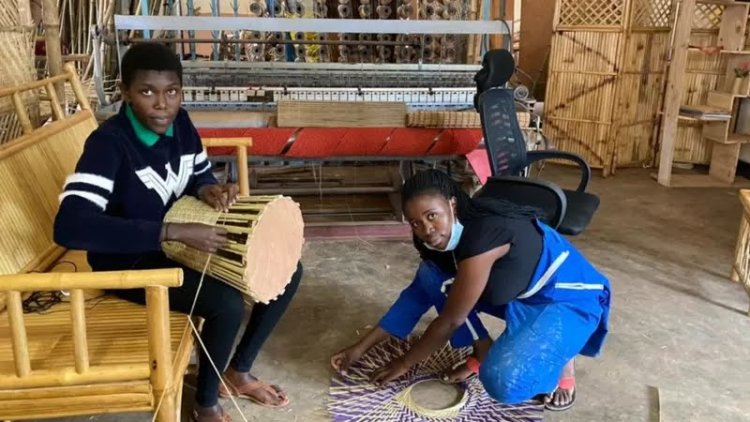Kigali: Bamboo furniture making transforms young women from unemployed to entrepreneurs

Growing number of Rwandan youth have turned to bamboo furniture making and weaving business in a bid to tackle youth unemployment challenges in Rwanda, a landlocked country in East-Central Africa, after skills training by Chinese bamboo experts.
Youth unemployment is a challenge facing Rwanda, the state census of labor and employment published in May 2021, notes that unemployment rate is at 23%, and is higher in women (26%) compared to men (19%).
Jobs created, peer coaching …
Around 40 micro-enterprises on bamboo processing have been created and made a lot of contributions to job generation, particularly for women and youth since 2018.
Delphine Uwera, 25, is another trainee who also studied bamboo processing at Masaka Business Incubation Center in Kigali City and is now doing the job as her daily living business.
Currently, Uwera and other two co-workers own a business company which is called "All is Bamboo"

Chinese bamboo processing center rise in Rwanda
Irenee Gumyushime, one of the young trainees by Chinese bamboo experts says that they have jobs for themselves and now employing their fellow youth, bamboo processing has enabled him and his colleagues to acquire the necessary skills and expertise to be self-employed which is a key factor in reducing youth unemployment in the country.
"The Chinese experts introduced bamboo cultivation and processing in our country. They supported us with bamboo processing equipment and trained us on how to cultivate bamboo, harvest it and process it into final products for home use such as furniture, baskets, lamp holders, decorations, toothpicks and among others," Said Gumyushime.
Jean de Dieu Niyonkuru, says that he specializes in bamboo furniture making "I joined this center in 2015, I was trained in bamboo processing for a period of six months. I also spent another three months on hands-on training while receiving mentorship support from the experts," said Niyonkuru.
"I have got an opportunity to go to China for further training on bamboo processing. I am now doing very well; all my home furniture, arts and crafts are made in bamboo because I have a great passion for bamboo products. My livelihood depends on bamboo processing there is good business in bamboo products." He added.
Yu Qinhong, a Chinese expert at the center, said that he has trained Rwandan trainees at the center on how to make quality products from bamboo to attract more customers.
"Rwanda is suitable for developing the bamboo industry. They have bamboo raw materials and a large population of young people and Rwandans like the bamboo products," said Yu.
Yu reckoned that Rwanda's dry climate is favorable for bamboo furniture, which keeps the mold away from the bamboo furniture.
Obstacles and limitations
Gumyushime pointed out that they are now facing a challenge of getting new equipment for bamboo processing, because the existing equipment is old and worn-out, saying that the China-Aid Rwanda which has been supporting them has since phased out.
Bamboo also requires preservation. Bamboo shrinks much greater than any other type of timber especially when it loses water. Bamboo should be sufficiently treated against insect or fungus attack before being utilized for building purposes.
The Government contribution
Nshimiyimana Sypridion, the Acting Director General of the National Forestry Agency, says that bamboo cultivation and processing is among the reasons why the Chinese company was given a shore by the Rwandan lakes to plant bamboo that will be used to make various materials.
The bamboo sector is developing in Rwanda. The Rwanda Ministry of Environment and the Rwanda Development Board (RDB) have just signed an agreement with East Africa Bamboo Forest Industry for the creation of 2,300 hectares of bamboo in the districts of Kigali, Bugesera, Ngoma and Rwamagana.
By now, bamboo plantation in Rwanda covers 4382 hectares of land surface, corresponding to 1.82 percent of the total national forest cover.
Author: Marc Sikubwabo / www.fezaa.com


 Fezaa
Fezaa 



























